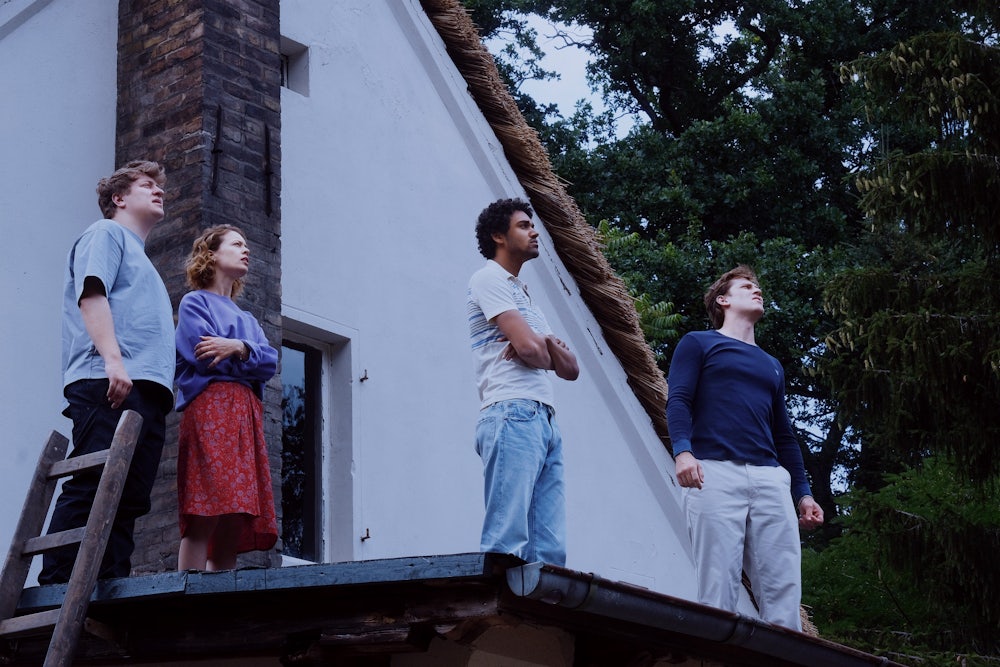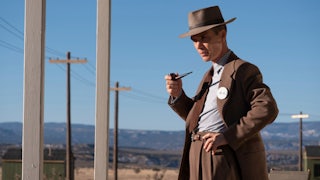Christian Petzold likes terrible, irreversible events: accidents, suicides, eternal separations. In his melodramas, Petzold has established a fascination with the trope of love lost at the hands of misrecognition. At the crossroads of historical circumstance and feelings of personal guilt and shame, his protagonists carry burdensome secrets, with devastating consequences. In Phoenix (2014), a woman survives the Holocaust only to have her husband mistake her identity, leading to her discovery that he was the one who turned her in to the Nazis. In Transit (2018), a refugee living under a fascist regime falls in love with a woman but struggles to disclose to her that her husband has died. The climactic tragedy of Undine (2020) follows from a misapprehension over a past lover.
His latest film at first appears to diverge from recent work. Set in contemporary seaside Germany, Afire takes a break from the backdrops of extreme repression and deprivation that the director has favored for at least a decade. Germany’s history surfaces here only in passing jokes, as when a character calls attention to the eccentricity of East German spellings of names. Taking cues from Éric Rohmer’s summertime romantic comedy-dramas, Petzold fills much of the film with routine errands, trips to the beach, and aimless conversations over dinner—scenes of leisure and languor that appear plotless.
To say that “nothing happens” in these sequences would be to dismiss all that does happen: fervent storytelling, late-night swims in bioluminescent waters, the kindling of new friendships and romances. At this relaxed tempo, Petzold appears to try something that is new for him, portraying the possibilities of life and love free from historical tempests and personal misfortune. Leon (Thomas Schubert), the protagonist, is rather insensitive to all this that takes place around him, preferring the joyless task of writing his novel—work that is neither getting done nor good.
Yet Afire is really a slow build to the disaster that Petzold does so well. Only by dint of calamitous events, it seems, can Leon awaken to the reality he resolutely shuts out. The arrival of a forest fire, suddenly overwhelming the plotless plot, seems to satisfy a perverse fantasy grounded in the belief that extremity is required for a life lived fully. Yet something is lost when a slow comedy of manners with no real storyline turns into a melodrama. How sustainable is this reliance on disaster for character growth and for inspiring feeling, the film seems to ask. And what if the events in question are part of an existential crisis for the planet, a series of catastrophes so severe that they imperil the future of life?
Leon is suffering the pressure of following up on the success of his debut novel while on vacation with his friend Felix (Langston Uibel). From the start, every hitch in their plans makes him crabby. First the car breaks down, then a third guest announces herself at their retreat, then the roof begins to leak. Leon reacts to these events with exasperation and entitlement, offering nothing in the way of practical solutions. Felix, by contrast, is nimble; quick to pick up on warning signs and solve problems. To Leon’s detriment, the two friends are true opposites: Felix agreeable, responsible, fun-loving, attractive; Leon serious.
Leon, the kind of person who would be horrible to spend real time around, is cinematically interesting for the desires he expresses when nobody is watching. The first such moment takes place as he eats his cereal in the morning, having just passed a sleepless night with loud sex noises wafting over from the adjoining room. From inside, he catches a glimpse at the culprit: Nadja (Paula Beer), a blonde Russian woman in a red dress, leaving the house with a sprightly step. He watches as she gets on her bike and pedals off, until Felix saunters in and asks if he has seen her. Leon says he has not, ashamed of his own interest.
His voyeurism becomes more active when Felix leaves him alone to go to the beach. Leon chooses to stay because he needs to work, a formula he rehearses ad nauseam. With Felix out of sight, he abandons his workstation beneath the pergola and meanders into Nadja’s room. Snooping around, he plays her vinyl, rummages through her notes and drawings, examines the items she’s splayed messily around her room. His expedition is cut short when he catches sight of Felix returning. In a frenzy, he replaces her items, bolts out of the house with an unaccustomed vitality, and arranges himself beneath the pergola, tapping at his keyboard as if he had been there all afternoon.
As Felix, Nadja, and Nadja’s lover, Devid (Enno Trebs), grow close, Leon confines himself to the pergola, where he conducts himself importantly and ineffectually at his laptop. Windows, recurrent motifs in Petzold’s films, become potent symbols of Leon’s pining and self-loathing, indulging his curiosity while shielding him from the reciprocal trial of being seen. During the day, he skulks around the premises, stealing glances at Nadja through the kitchen window as she cooks and cleans. From his bedroom, he condemns himself to preparing for his tough days ahead of writing, looking on wistfully as they divert themselves outdoors with a game of badminton played with light-up rackets. Leon soon encounters what he fears the most. As he peers at their game, Nadja registers his gaze and returns it.
Leon proves susceptible to narrow-minded assumptions: He is rude to Devid because he is a lifeguard, and he is slow to catch on to Felix and Devid’s developing romantic involvement. His perception of those around him is prescribed rigidly by dominant social scripts, and his own identity is fashioned after an ideal type that only renders selective desires, observations, people, and events legible to him. And he is excessively sensitive. When Nadja offers to read a draft, he is rattled, claiming that one misplaced comment from her could derail the whole enterprise, referring to a prior incident with a “cleaning lady.” When he finally lets her read it, he watches her leaf through the pages with paranoia and flies into a rage when she indicates tersely that she doesn’t like it.
Scenes of Leon’s tedious attempts to work are followed shortly by the most impressive scene in Afire, when Leon realizes that he is far from the most impressive intellect at the vacation home. Over a dinner with his publisher, Helmut (Matthias Brandt), Nadja reveals that she is in fact a literary scholar. She is working on a thesis about the “quake of love” and the “quake of representation,” which draws on Heinrich von Kleist’s novella The Earthquake in Chile. Pushed further, she names her favorite poem, Heinrich Heine’s “The Asra,” about a tribe who “perish when they love”—a text Helmut admires. She recites it once and, upon encouragement, again, her radiance on full display. Devid gleams straightforwardly with pride, while Leon looks around in embarrassed horror. With Nadja’s identity made clearer, he must consider her reproof of his book and of his character anew. Her returned gaze suggests that the novelist beneath the pergola is not the only one who has been making meaning out of things.
Suddenly an encroaching forest fire rains down ash on their property. It is as if Nadja’s reading has unleashed the very kind of natural disaster that is the subject of her thesis. Under new conditions of emergency, the rhythm, tone, and genre of the film are transformed. With dizzying speed, it hastens toward its final cadenza. Leon looks upon a scene he compares to the charred and embalmed lovers of Pompeii, then loses Nadja, with whom, he realizes too late, he was in love. He finally finds a deserving topic for his novel.
Petzold has wrestled with the ethics of telling stories about disaster before. Midway through Transit (2018), the protagonist, a man who has assumed the identity of a writer in order to flee his country, faces interrogation by the consul. Asked whether he will criticize his country in writing, he responds:
When I was a small boy, I often went to school outings. Some were great. But unfortunately, the next day, our teacher would have us write an essay: “Our School Trip.” And after the holidays, there was always an essay: “What I did on Holiday.” Or “The Best Part of Holidays.” … At some point it felt like I was experiencing it all just to write a school essay about it. And for the writers who were with me in the camps, all the terrifying and horrific events were only material for their writing. The camp. The escape. Death. The war. I won’t be writing any more school essays.
The speech, delivered with conviction, expresses a distaste for artists who capitalize on atrocities by converting them into creative inspiration. And yet the character performs this disavowal of writing while using a stolen identity. Does he really mean it? At the last minute, the protagonist gives his precious exit visa to a doctor, surrendering both his new lover and the prospect of a better life. Sentenced to living out the rest of his life in this bleak setting, he recounts his tale to a bartender—his only respite now is to tell stories from his past life—furnishing the narrative frame of the film. By the end of Transit, Petzold re-sanctifies a lofty narrative of grand loves and grand sacrifices.
In Afire, Petzold revisits the question posed in Transit. Does the search for humanity in cataclysm—a pursuit that can take over one’s life—make us, conversely, less human? Petzold has signaled his own identification with Leon in interviews. The writer and director both gravitate toward narratives in which young men look to big, recognizably life-altering events—insurmountable love and loss—to transform them.
When Helmut reads the opening pages of Leon’s uninspired first draft while reviewing them with him in a meeting, it becomes readily apparent why Nadja reacted to them with disgust. It is a cloying, misogynistic piece about a missed connection, chock-full of references to the woman in question’s “cleavage.” With the events in the last act of Afire, Leon finally possesses “real experience” of the sort that can rescue him from his solipsistic writing. His writing and conduct outwardly improve at a rapid clip. The newly mature Leon is thoughtful and expansive, yet there is something garish about his transformation at the eleventh hour.
Over and over again, Petzold’s characters have been made to reckon with their responsibilities in the wreckage of history, tasked with reimbuing a wayward world with dignity. The characters of Afire confront a crisis that threatens to vacate all narratives of meaning, and Leon comes out the other end with a feeble text. It’s better than what came before, but can it begin to make sense of what has taken place? This time, the atrocity is not historical but natural, and Petzold is cynical about the redemptive potential of melodrama in an age in which disasters, if still largely caused by human decisions, unfold beyond the grasp of our control. If he wants Leon to scrutinize the stories he tells about himself, the ending of Afire suggests that there is a possibility he finds even more concerning: a future with no stories at all.






